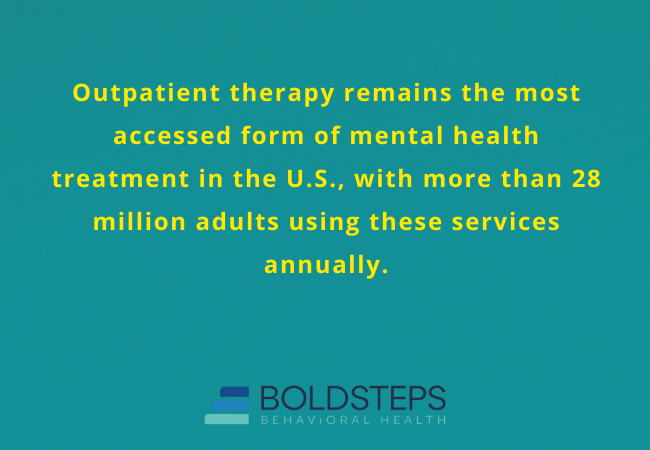Choosing the right mental health or addiction treatment is not about how severe your condition is—it’s about choosing the right level of support for your current needs. At Bold Steps Behavioral Health in New Hampshire, we provide both Outpatient Treatment and Intensive Outpatient Programs (IOP) as part of a full continuum of care. But which one is best for you?
In this blog, we’ll help you compare outpatient and intensive outpatient services—based on time commitment, flexibility, clinical support, and more—to help you make the most informed decision about your care.
What Is Outpatient Treatment? A Flexible Approach
Outpatient treatment is the least intensive level of care offered at our Behavioral Health Treatment Center in New Hampshire. It typically includes:
- Weekly or biweekly individual therapy
- Optional group sessions
- Medication management (if needed)
- Ongoing treatment planning and support
You continue to live at home, go to work or school, and attend therapy appointments that fit your schedule. It’s ideal for those who are stable, but still need clinical support.
What Is an Intensive Outpatient Program (IOP)? Structure Without Hospitalization
IOP offers more frequent and structured therapy than standard outpatient. It typically involves:
- 3–5 sessions per week, each lasting 3 hours
- Group therapy, individual sessions, and psychiatry
- Skills training, relapse prevention, and case management
- Peer support and psychoeducation
Our Intensive Outpatient Program in New Hampshire is designed for individuals who need consistent clinical support but don’t require full-time hospitalization or a Partial Hospitalization Program in New Hampshire (PHP).
Comparing IOP vs. Outpatient: Side-by-Side Breakdown
| Feature | Outpatient Treatment | Intensive Outpatient Program (IOP) |
|---|---|---|
| Time Commitment | 1–3 hours/week | 9–15 hours/week |
| Structure | Flexible | Highly structured |
| Format | Individual therapy; optional groups | Group therapy, individual therapy, psychiatry |
| Suitability | Mild symptoms or maintenance | Moderate symptoms; step-down from PHP |
| Schedule | Fully customizable | Morning, evening, or hybrid blocks |
| Duration | Ongoing or long-term | Typically 6–12 weeks |
| Cost | Lower cost | Moderate; usually covered by insurance |
Who Benefits Most from Standard Outpatient Care?
Outpatient treatment is a great option for individuals who:
- Are experiencing mild symptoms of anxiety, depression, or stress
- Have already completed IOP, PHP, or residential treatment
- Want to maintain stability with long-term therapy and support
- Need psychotherapy or psychiatric oversight while managing full-time work, school, or caregiving
It’s especially effective for clients in relapse prevention, grief recovery, or those in a stable phase of dual diagnosis recovery.
When Is IOP the Better Choice?
Choose IOP if you:
- Experience frequent emotional distress, panic attacks, or mood swings
- Are struggling with substance use, cravings, or recent relapse
- Have recently completed inpatient or PHP care and need step-down support
- Find daily tasks overwhelming due to mental health symptoms
- Need more than once-a-week therapy to stabilize and progress
IOP offers a critical in-between level of care that helps you avoid hospitalization while still receiving daily therapeutic support.
The Role of Structure in Intensive Outpatient Programs
Why is structure so important in IOP?
- It provides routine—helping to stabilize mood and build confidence
- You learn skills in a safe, supportive space, then apply them in real life
- Consistent attendance creates momentum and progress
- You receive feedback, connection, and professional guidance daily or several times a week
Structure is one of the most important predictors of long-term success in both mental health and substance use recovery.
Transitioning Between Levels of Care: PHP, IOP, and Outpatient
At Bold Steps NH, we help you move between levels of care as your needs change. The care continuum includes:
- Partial Hospitalization Program (PHP) – Up to 6 hours/day for those needing high-intensity support
- Intensive Outpatient Program (IOP) – 3–5 days/week with flexibility and structure
- Outpatient Treatment – Weekly/biweekly check-ins and therapy for maintenance
We adjust your care plan weekly to reflect your progress and personal circumstances.
Dual Diagnosis Support: Mental Health and Addiction in Both Settings
Many clients face both mental health and substance use challenges. Whether you’re in outpatient or IOP, our programs offer integrated dual diagnosis care, which includes:
- Depression Treatment Program in New Hampshire
- Anxiety Disorder Treatment in New Hampshire
- Addiction Treatment Program in New Hampshire
You receive simultaneous treatment for both conditions using evidence-based approaches designed to reduce relapse and promote mental stability.
Therapies Used in IOP and Outpatient at Bold Steps NH
Our clinicians use a variety of therapies to meet you where you are:
- Cognitive Behavioral Therapy (CBT) – For thought and behavior change
- Dialectical Behavior Therapy (DBT) – For emotional regulation and distress tolerance
- Motivational Interviewing (MI) – For building readiness and confidence
- Trauma-Informed Therapy – For clients with PTSD, childhood trauma, or abuse histories
- Mindfulness and Wellness Education – For stress management and self-care
In IOP, you experience these modalities more frequently and in multiple settings (group + individual). In outpatient, therapy is less frequent but still powerful.
Real-World Functioning: How Each Level Fits Your Life
Outpatient
- You can work full-time
- Attend school with minimal disruption
- Maintain full autonomy in your schedule
- Great for long-term or post-recovery support
IOP
- Part-time work or school may still be manageable
- Designed for short-term, intensive treatment
- Helps create routine and rebuild functioning
- Best for clients still developing coping and life skills
Both allow you to live at home, but IOP offers the additional clinical intensity needed to get back on your feet more quickly.
Family and Social Support in Both Programs
At Bold Steps NH, we know recovery thrives in healthy relationships. Both IOP and outpatient treatment may include:
- Family therapy to rebuild trust and communication
- Education sessions for loved ones about mental illness or addiction
- Boundary-setting support to create healthy dynamics
- Access to community groups and peer mentorship
You don’t have to go through healing alone—we help you create or strengthen a reliable support network.
Insurance, Accessibility, and Scheduling Considerations
Most insurance providers cover both outpatient and IOP services. At Bold Steps NH, we offer:
- Assistance with insurance verification and benefits
- Telehealth options for therapy sessions and medication management
- Morning, afternoon, and evening IOP groups
- Easy transitions between programs with no disruption in care
We remove the barriers to make treatment as accessible and seamless as possible.
Why Choose Bold Steps NH for Personalized Treatment Planning
As a leading Behavioral Health Treatment Center in New Hampshire, Bold Steps provides:
- A full range of care: PHP, IOP, and outpatient
- Licensed, compassionate clinicians and psychiatric providers
- Dual diagnosis treatment expertise
- Flexible and individualized treatment schedules
- Safe, respectful, and supportive care environments
- Long-term support planning and aftercare coordination
We don’t just offer services—we offer solutions that fit your life.
Conclusion
Recovery is not a one-size-fits-all journey. Whether you need the flexibility of outpatient care or the structure of an IOP, the most important thing is starting with what fits your goals, your symptoms, and your life.
Call Bold Steps NH today at 603.915.4223 to schedule a confidential assessment and take your next bold step toward wellness—with the level of care that’s right for you.
FAQ on Outpatient vs. IOP
What’s the difference between outpatient and IOP treatment?
Outpatient therapy involves 1–2 sessions per week, while IOP includes 3–5 sessions per week, offering more structure and support for moderate mental health or addiction concerns.
How do I know if I need IOP instead of outpatient care?
If your symptoms interfere with daily functioning or you’ve recently relapsed, IOP may provide the consistent care needed to stabilize and progress.
Can I work or go to school during IOP?
Yes. IOP at Bold Steps NH is designed to fit into your life, with morning, evening, and telehealth options available.
Is outpatient care enough for anxiety or depression?
For mild to moderate cases, outpatient therapy may be sufficient. For more severe symptoms, IOP or PHP may be recommended.
Does Bold Steps NH offer both mental health and addiction support?
Yes. We provide integrated dual diagnosis care through our Depression Treatment, Anxiety Disorder Treatment, and Addiction Treatment Programs in New Hampshire.
Can I move between levels of care?
Absolutely. Our team will help you step up or down between PHP, IOP, and outpatient programs as your needs change.



